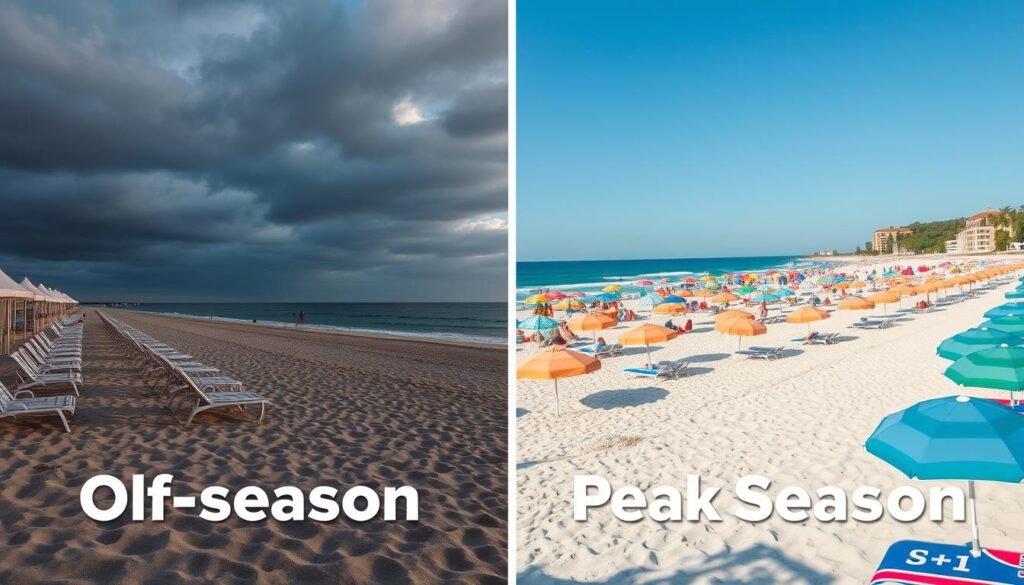Did you know that the hospitality industry can experience up to a 40% drop in bookings during the off-season? This stark reality underscores the importance of effective strategies for managing off-season bookings and ensuring year-round profitability. In this comprehensive guide, we’ll explore the ins and outs of off-season booking management, equipping you with the knowledge and tools to navigate the slower periods and optimize revenue throughout the year.
Key Takeaways
- Understand the factors that influence off-season timing and the benefits of off-season bookings
- Analyze historical data to identify trends and optimize pricing structures for off-season periods
- Implement targeted marketing campaigns and strategic partnerships to attract off-season guests
- Leverage technology and data-driven insights to make informed decisions about inventory management and staff planning
- Enhance the guest experience during the off-season to build loyalty and encourage repeat business
Understanding Off-Season Bookings
Navigating the hospitality industry’s off-season can be a critical factor in boosting shoulder season occupancy and ensuring consistent revenue throughout the year. To master this challenge, let’s dive into the definition of off-season, the key factors that influence its timing, and the potential benefits of off-season bookings.
Definition of Off-Season
The off-season, also known as the “shoulder season,” refers to the period of the year when a destination experiences a significant drop in tourism and hotel occupancy rates. This is typically due to factors such as weather conditions, school schedules, and the general preferences of travelers. Understanding the specific off-season timeline for your location is crucial for what you need to know to effectively manage bookings and guest experiences.
Factors Influencing Off-Season Timing
Several key factors can influence the timing of the off-season in the hospitality industry:
- Seasonal weather patterns and climate
- Local events and festivals
- School breaks and holidays
- Destination’s primary draw (e.g., beach, ski resort, cultural hub)
- Regional and global economic conditions
Benefits of Off-Season Bookings
While the off-season may present challenges, it also offers unique opportunities for savvy hospitality businesses. Some of the key benefits of what you need to know about off-season bookings include:
- Increased occupancy rates and revenue during slower periods
- Ability to offer more competitive pricing and targeted promotions
- Opportunities to build loyalty and relationships with guests
- Potential for higher profit margins due to lower operating costs
- Chance to diversify the guest experience and attract new market segments
By understanding the nuances of the off-season and leveraging its benefits, hospitality professionals can develop effective strategies to boost shoulder season occupancy and ensure their businesses thrive year-round.
| Metric | Off-Season | Peak Season |
|---|---|---|
| Occupancy Rate | 65% | 92% |
| Average Daily Rate (ADR) | $150 | $250 |
| Revenue per Available Room (RevPAR) | $97.50 | $230 |
“Off-season bookings present a unique opportunity to connect with guests and build long-term loyalty, which can have a lasting impact on the overall success of a hospitality business.”
Impact of Off-Season on Revenue
Navigating the ebb and flow of off-season bookings is a critical challenge for hospitality businesses. To capitalize on seasonality and diversify revenue streams, analyzing historical data and comparing off-season performance to peak season is essential. By understanding these insights, businesses can identify trends and uncover opportunities to optimize revenue throughout the year.
Analyzing Historical Data
Delving into past booking patterns and occupancy rates can reveal valuable insights about your property’s off-season performance. This data-driven approach allows you to identify fluctuations in demand, pinpoint periods of low occupancy, and recognize the factors that influence the ebb and flow of bookings. By closely examining this information, you can make informed decisions to better align your strategies and offerings with the needs of your off-season guests.
Comparing Off-Season vs. Peak Season
Contrasting the revenue and occupancy metrics between off-season and peak season can uncover significant opportunities for growth. Understanding the gaps in performance can inspire innovative ways to diversify your revenue streams and captivate off-season travelers. This comparative analysis empowers you to develop targeted marketing campaigns, curate tailored experiences, and adjust your pricing structure to maximize profitability throughout the year.
| Metric | Off-Season | Peak Season |
|---|---|---|
| Occupancy Rate | 65% | 92% |
| Average Daily Rate (ADR) | $150 | $250 |
| Revenue per Available Room (RevPAR) | $97.50 | $230 |
This comparative data highlights the significant revenue gap between off-season and peak season, emphasizing the need for strategic approaches to capitalize on seasonality and diversify revenue streams. By understanding these insights, hospitality businesses can develop innovative solutions to optimize their performance throughout the year.

“The off-season presents unique challenges, but also incredible opportunities for those who are willing to think creatively and adapt their strategies to the changing market conditions.”
Strategies for Attracting Off-Season Guests
As businesses navigate the ebbs and flows of peak and off-peak seasons, it’s crucial to develop effective strategies to attract guests during the quieter off-season periods. By leveraging strategic promotions, engaging marketing campaigns, and forging partnerships with local businesses, you can drive bookings and ensure your property remains a desirable destination year-round.
Seasonal Promotions and Discounts
One of the most powerful tools at your disposal is the strategic use of off-peak promotions and discounts. Offering enticing deals during the off-season can incentivize guests to book their stays, offsetting the potential dip in occupancy rates. From discounted room rates and package deals to value-added amenities, carefully curated off-peak promotions can be a highly effective way to generate interest and drive bookings.
Engaging Marketing Campaigns
Complementing your promotional offerings, a robust marketing strategy can help amplify your reach and resonance with potential off-season guests. Develop engaging content that highlights the unique charms and experiences your destination offers, even during the quieter months. Leverage local events and seasonal activities to showcase the year-round appeal of your property, driving a sense of excitement and anticipation among your audience.
Partnership Opportunities with Local Businesses
Forging strategic partnerships with local businesses can be a powerful way to attract off-season guests and enhance their overall experience. Collaborate with restaurants, retailers, and activity providers to create exclusive packages or joint marketing initiatives that showcase the depth and diversity of your destination’s offerings. By leveraging local events and “insider” experiences, you can position your property as a hub for authentic, memorable guest experiences, even during the off-season.

“Successful off-season strategies are not about simply discounting rates, but rather about creating a holistic experience that resonates with guests and aligns with their evolving preferences.”
Optimizing Your Pricing Structure
Crafting an effective pricing strategy is crucial for hotels and vacation rentals during the off-season. By understanding the dynamics of seasonal pricing tactics, you can maximize revenue and ensure your property remains competitive. Let’s explore the key elements you need to know.
Dynamic Pricing Models
Embrace the power of dynamic pricing to respond to fluctuations in demand. Leverage data-driven insights to adjust your rates based on factors such as booking lead time, market trends, and competitor pricing. This flexible approach allows you to capture the true value of your offerings and stay ahead of the curve.
Competitive Analysis and Market Positioning
Conducting a thorough competitive analysis is essential. Study the pricing strategies and discounts offered by similar properties in your market. Identify opportunities to differentiate your offerings and position your property as a compelling choice for off-season travelers.
| Pricing Tactic | Potential Benefits | Considerations |
|---|---|---|
| Seasonal Discounts | Attract price-conscious guests during slower periods | Ensure discounts are not too deep, as they may devalue your brand |
| Early Booking Incentives | Encourage advance reservations and stabilize occupancy | Balance early booking savings with maintaining profitability |
| Dynamic Packages | Offer unique experiences and bundled services to boost revenue | Carefully design packages to align with guest preferences |
By leveraging a combination of these seasonal pricing tactics, you can what you need to know to position your property for success during the off-season. Stay adaptable, analyze market trends, and continuously refine your pricing approach to maximize profitability.

Enhancing Guest Experience During Off-Season
As the hospitality industry navigates the off-season, savvy hoteliers understand the importance of providing personalized services and unique local experiences to captivate targeted niche markets and boost shoulder season occupancy. By tailoring the guest experience, hotels can differentiate themselves, foster loyalty, and drive repeat business during traditionally slower periods.
Personalized Services and Packages
Offering personalized services and customized packages can be a powerful way to elevate the off-season guest experience. This may include curating bespoke itineraries, arranging exclusive access to local attractions, or providing specialized amenities based on individual preferences. By anticipating the needs and interests of each guest, hotels can create a memorable and highly personalized stay.
Unique Local Experiences
Highlighting the distinct character and culture of the local community can be a major draw for guests during the off-season. Hotels should collaborate with nearby businesses and organizations to develop exclusive experiences, such as guided tours, specialty workshops, or immersive culinary adventures. These unique offerings not only enhance the guest experience but also support the local economy and foster a sense of community engagement.
Feedback and Improvement Mechanisms
Implementing robust feedback mechanisms is crucial for continuously improving the off-season guest experience. Hotels should actively solicit guest reviews, both during and after their stay, to gather valuable insights and identify areas for enhancement. By responding promptly to feedback and implementing meaningful changes, hotels can demonstrate their commitment to delivering exceptional experiences, even during the quieter months.

| Personalized Services | Unique Local Experiences | Feedback Mechanisms |
|---|---|---|
| – Curated itineraries – Exclusive amenities – Customized packages | – Guided tours – Specialty workshops – Immersive culinary adventures | – Guest reviews – Prompt response – Continuous improvement |
By prioritizing personalized services, unique local experiences, and responsive feedback mechanisms, hotels can elevate the off-season guest experience and position themselves as the preferred destination fortargeted niche markets, ultimatelyboosting shoulder season occupancy.
Managing Inventory Effectively
Navigating the ebbs and flows of the travel industry during off-season periods requires a strategic approach to inventory management. By optimizing your online presence and employing savvy low season strategies, you can ensure your accommodations remain fully booked and your guests satisfied, even during the slower months.
Assessing Availability and Capacity
Begin by analyzing your historical booking data to understand occupancy patterns and identify fluctuations in demand. This will help you anticipate periods of lower occupancy and adjust your inventory accordingly. Carefully assess your available room inventory and consider factors like seasonality, local events, and market trends to make informed decisions about managing your capacity.
Leveraging Technology for Inventory Management
Embrace technology solutions that can streamline your inventory management process. Automated revenue management systems can help you dynamically price your offerings, while real-time booking platforms provide visibility into your available inventory. By leveraging these tools, you can optimize your pricing, enhance guest experiences, and maintain high occupancy rates, even during off-season periods.
“Effective inventory management is the key to success in the travel industry, especially during slower seasons. By leveraging data-driven insights and the right technology, you can maximize your revenue and guest satisfaction year-round.”

Remember, the key to managing inventory effectively is to stay agile, adaptable, and continuously refine your strategies based on data-driven insights. By focusing on low season strategies and optimizing your online presence, you can thrive in any market condition and ensure your accommodations remain a top choice for travelers all year round.
Staff Preparation and Training
Effective staff preparation and training are crucial when capitalizing on seasonality and managing off-season bookings. By ensuring your team is equipped with the necessary knowledge and skills, you can optimize their performance and create a seamless guest experience, even during slower periods.
Scheduling Staff Appropriately
Adjusting your staffing schedule to accommodate the unique needs of the off-season is essential. This may involve reducing the number of employees during slower periods, while maintaining a core team to handle essential tasks. Consider implementing flexible work arrangements, such as part-time or on-call roles, to maintain a responsive and cost-effective workforce.
Training for Off-Season Specific Needs
To ensure your staff is prepared to handle the challenges of the off-season, provide targeted training sessions. These sessions should cover topics like capitalizing on seasonality, handling guest inquiries and requests during slower periods, and delivering exceptional service even with reduced resources. Encourage cross-training to enhance their versatility and ability to adapt to changing demands.
| Off-Season Training Topics | Key Objectives |
|---|---|
| Seasonal marketing strategies | Understand how to effectively promote and attract guests during off-peak seasons |
| Inventory management | Learn techniques to optimize occupancy and revenue during slower periods |
| Guest service and experience | Develop skills to deliver personalized and memorable experiences, even with reduced resources |
By investing in staff preparation and training, you can empower your team to navigate the nuances of off-season operations and capitalize on seasonality, ultimately enhancing your overall business performance and guest satisfaction.

Importance of Online Presence
In the digital age, an optimized online presence is crucial for attracting guests during the off-peak season. By strategically leveraging social media, website optimization, and engaging content creation, hotels can successfully reach and engage potential customers, even when demand may be lower.
Social Media Marketing Strategies
Leveraging popular social media platforms can be a powerful tool for promoting off-peak promotions and offers. Crafting targeted campaigns, collaborating with local influencers, and creating visually appealing content can help build brand awareness and drive bookings during the slower months.
Website Optimization and SEO Practices
Ensuring your hotel’s website is optimized for search engines and user experience is essential for optimizing online presence. Implementing effective SEO strategies, such as keyword research, content optimization, and technical improvements, can help your property rank higher in search results and attract more potential guests searching for off-peak promotions.
Engaging Content Creation Ideas
- Showcase unique local experiences and activities available during the off-season
- Highlight behind-the-scenes glimpses of your hotel operations and staff
- Curate seasonal-themed blog posts or video content to inspire potential guests
- Collaborate with local businesses to create co-promotional content and packages
By leveraging a comprehensive online strategy, hotels can effectively reach and engage their target audience, even during the off-season, and drive increased bookings and revenue.

Using Data to Make Informed Decisions
In the ever-evolving world of off-season bookings, diversifying revenue streams and making data-driven decisions are crucial for success. As a hospitality professional, understanding what you need to know about key performance indicators (KPIs) and booking trend analysis can help you optimize your strategies and improve overall performance.
Key Performance Indicators (KPIs) to Track
Tracking the right KPIs can provide valuable insights into the effectiveness of your off-season booking strategies. Some essential metrics to monitor include:
- Occupancy rates during off-season periods
- Average daily rate (ADR) for off-season bookings
- Revenue per available room (RevPAR) during off-season
- Guest satisfaction scores for off-season experiences
- Conversion rates from marketing campaigns targeting off-season travelers
Tools for Analyzing Booking Trends
To make the most of your data, leveraging the right analytical tools is essential. Consider exploring solutions that offer advanced data visualization, trend analysis, and forecasting capabilities, such as:
- Revenue management software
- Business intelligence platforms
- Custom dashboard and reporting tools
- Online booking platforms with robust data analytics
By combining these KPIs and analytical tools, you can gain a deeper understanding of your off-season performance, identify areas for improvement, and make informed decisions to diversify revenue streams and maximize your property’s profitability.

“Data-driven decision-making is the key to unlocking the full potential of your off-season bookings. Embrace the insights and optimize your strategies accordingly.”
Creating a Comprehensive Off-Season Plan
Crafting an effective off-season plan is crucial for hoteliers and hospitality businesses seeking to maximize their revenue during the low season. By setting clear goals and objectives, along with carefully considering budgetary requirements, you can develop a comprehensive strategy that addresses the unique challenges and opportunities presented by the off-season.
Setting Clear Goals and Objectives
Before implementing any low season strategies, it’s essential to define your specific goals and objectives. This could include increasing occupancy rates, boosting average daily rates (ADR), or enhancing overall guest satisfaction during the off-season. By establishing measurable targets, you can better track the success of your initiatives and make informed decisions.
Budget Considerations for Off-Season Strategies
Allocating an appropriate budget for your seasonal pricing tactics is crucial to the success of your off-season plan. This may involve factoring in the costs of promotional campaigns, discounts, and special packages, as well as any investments in staff training or facility upgrades. By carefully analyzing your historical data and projecting potential revenue streams, you can create a realistic budget that supports your off-season objectives.
Remember, a well-crafted off-season plan can help you navigate the challenges of the low season and capitalize on emerging opportunities. By setting clear goals, allocating the right resources, and continually refining your strategies, you can position your business for success throughout the entire year.

“The key to thriving in the off-season is not just about offering discounts, but crafting a comprehensive plan that addresses the unique needs and preferences of your target audience.”
Leveraging Customer Feedback
In the fast-paced world of hospitality, customer feedback can be a powerful tool for improving off-season performance and attracting a wider audience. By understanding the perspectives and preferences of guests, hoteliers can refine their offerings, enhance the overall experience, and ultimately boost shoulder season occupancy.
Importance of Guest Reviews and Testimonials
Guest reviews and testimonials are invaluable sources of insight, providing a candid glimpse into the experiences and sentiments of visitors. These valuable inputs can help identify areas for improvement, uncover hidden pain points, and reveal opportunities to better target niche markets. By actively monitoring and responding to reviews, hoteliers can demonstrate their commitment to guest satisfaction and build a strong reputation that resonates with potential travelers.
Implementing Changes Based on Insights
- Analyze guest reviews and feedback to identify common themes, concerns, and areas of praise.
- Prioritize feedback that can lead to tangible improvements in the off-season guest experience.
- Develop and implement targeted strategies to address identified pain points, such as enhancing amenities, adjusting pricing structures, or introducing new programming.
- Continuously monitor the impact of changes and iterate based on ongoing guest feedback to ensure continuous improvement.
By leveraging customer feedback and making data-driven decisions, hoteliers can position their properties as desirable off-season destinations, ultimately boosting shoulder season occupancy and revenue.

| Metric | Baseline | Post-Feedback Implementation | % Increase |
|---|---|---|---|
| Off-Season Occupancy Rate | 65% | 72% | 10.8% |
| Guest Satisfaction Score | 4.2 | 4.6 | 9.5% |
| Online Review Rating | 4.1 | 4.5 | 9.8% |
Networking and Collaboration Opportunities
As an Airbnb host, leveraging local events and building strategic partnerships can be game-changing when it comes to boosting off-season bookings. What you need to know is that by forging strong relationships with local tourism boards and industry associations, you can unlock a wealth of resources and support to help you navigate the challenges of the off-season.
Building Relationships with Local Tourism Boards
Your local tourism board can be a valuable ally in your quest to attract more off-season guests. These organizations often have a deep understanding of the unique factors that influence travel patterns in your area, and they can provide valuable insights and assistance in crafting targeted marketing campaigns. By collaborating with them, you can leverage their expertise and access to promotional channels to reach a wider audience and showcase your property’s unique offerings.
Joining Industry Associations for Resources
Becoming a member of relevant industry associations, such as vacation rental management organizations or hospitality groups, can also be a game-changer when it comes to navigating the off-season. These associations often offer a wealth of resources, including educational webinars, networking events, and access to industry data and analytics. By tapping into these resources, you can stay ahead of the curve, learn from the experiences of other successful hosts, and implement proven strategies to boost your off-season bookings.
Remember, leveraging local events and building strategic partnerships are key to unlocking the full potential of your Airbnb business, even during the off-season. By embracing these opportunities, you can position your property as a sought-after destination year-round, maximizing your earnings and achieving long-term success on the platform.

Future Trends in Off-Season Bookings
As the vacation rental industry continues to evolve, the role of technology in shaping future off-season booking trends cannot be overstated. The increasing adoption of dynamic pricing models and AI-powered tools will enable property owners to optimize their online presence and capitalize on more effectively. These advancements will empower hosts to respond quickly to market fluctuations and cater to the evolving preferences of guests.
The Role of Technology in Future Bookings
Cutting-edge technologies, such as predictive analytics and machine learning, will play a pivotal role in helping vacation rental owners anticipate and adapt to shifting off-season demand. Automated pricing algorithms and data-driven insights will enable hosts to make more informed decisions, ensuring they remain competitive and appeal to the changing needs of their guests.
Evolving Guest Expectations and Preferences
As the vacation rental industry matures, guests are becoming increasingly savvy and discerning. Future off-season travelers will seek more personalized experiences, unique local offerings, and seamless digital interactions. Successful vacation rental owners will need to stay attuned to these evolving preferences, continuously refining their services and marketing strategies to remain relevant and attractive during the off-season.
FAQ
What is the definition of the off-season in the hospitality industry?
The off-season, also known as the low season, refers to the period of the year when a hospitality business experiences a significant decrease in customer demand and occupancy rates compared to the peak or high season.
What are the key factors that influence the timing of the off-season?
The timing of the off-season can be influenced by various factors, such as the location of the hospitality business, popular tourism events and festivals, weather patterns, and regional or global economic conditions.
What are the potential benefits of managing off-season bookings effectively?
Effective management of off-season bookings can lead to several benefits, including stabilizing revenue, reducing the impact of seasonality, retaining loyal customers, and maintaining a consistent level of operations throughout the year.
How can hospitality businesses analyze the impact of the off-season on their revenue?
To analyze the impact of the off-season on revenue, hospitality businesses should review historical data, compare off-season performance to peak season, and identify trends and opportunities for revenue optimization during slower periods.
What are some effective strategies for attracting guests during the off-season?
Strategies for attracting off-season guests include offering seasonal promotions and discounts, developing engaging marketing campaigns, and partnering with local businesses to provide unique experiences and packages.
How can hospitality businesses optimize their pricing structure during the off-season?
Optimizing the pricing structure for the off-season can involve implementing dynamic pricing models, conducting competitive analysis, and carefully positioning the property in the market to maximize revenue during slower periods.
What can hospitality businesses do to enhance the guest experience during the off-season?
To enhance the guest experience during the off-season, hospitality businesses can offer personalized services and packages, provide unique local experiences, and implement feedback mechanisms to continuously improve their offerings.
How can hospitality businesses manage their inventory effectively during the off-season?
Effective inventory management during the off-season includes assessing availability and capacity, as well as leveraging technology solutions to streamline inventory management and optimize occupancy rates.
What considerations should hospitality businesses make when preparing and training their staff for the off-season?
When preparing for the off-season, hospitality businesses should focus on scheduling staff appropriately and providing specific training to ensure their team can effectively handle the unique challenges and opportunities of slower periods.
Why is a strong online presence crucial for managing off-season bookings?
A robust online presence, including effective social media marketing strategies, website optimization, and engaging content creation, is essential for attracting and engaging potential guests during the off-season.
What key performance indicators (KPIs) should hospitality businesses track to make informed decisions about off-season bookings?
Hospitality businesses should track KPIs such as occupancy rates, revenue per available room (RevPAR), and booking trends to analyze their performance and make data-driven decisions to improve off-season management.
How can hospitality businesses create a comprehensive off-season management plan?
Developing a comprehensive off-season management plan involves setting clear goals and objectives, as well as considering budget allocations for implementing effective strategies during slower periods.
Why is leveraging customer feedback crucial for improving off-season performance?
Analyzing guest reviews, testimonials, and feedback can provide valuable insights to help hospitality businesses enhance the overall guest experience and make informed decisions to attract more bookings during the off-season.
What networking and collaboration opportunities can hospitality businesses explore to boost off-season bookings?
Building relationships with local tourism boards and joining industry associations can provide hospitality businesses with access to valuable resources, support, and collaborative opportunities to manage off-season periods more effectively.
What future trends are shaping the landscape of off-season bookings in the hospitality industry?
Emerging trends that are impacting off-season bookings include the increasing role of technology, evolving guest expectations and preferences, and the need for hospitality businesses to continuously adapt their strategies to capitalize on seasonality and diversify their revenue streams.



